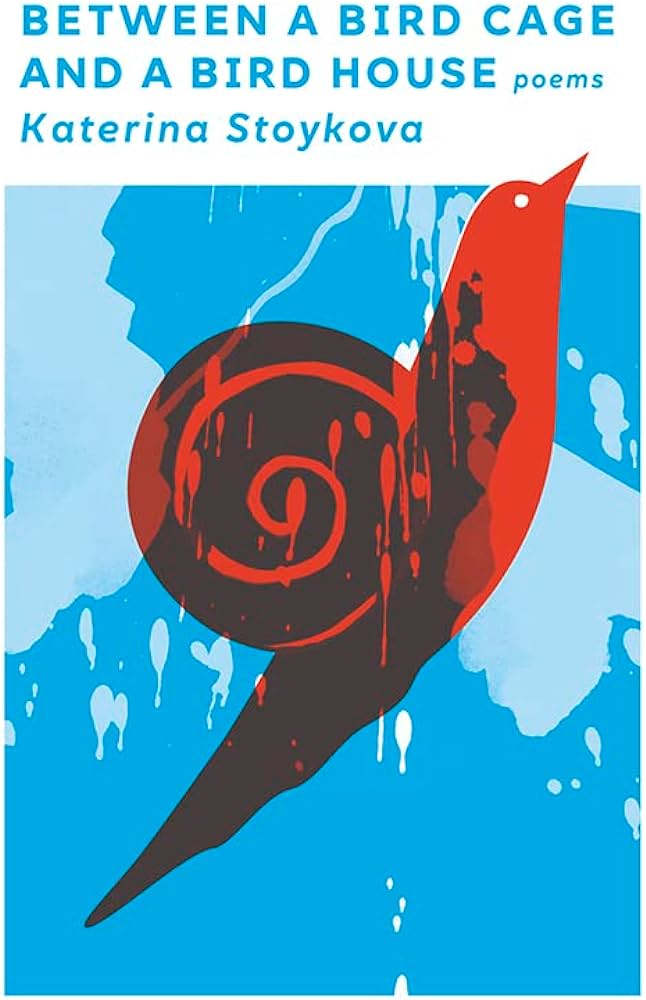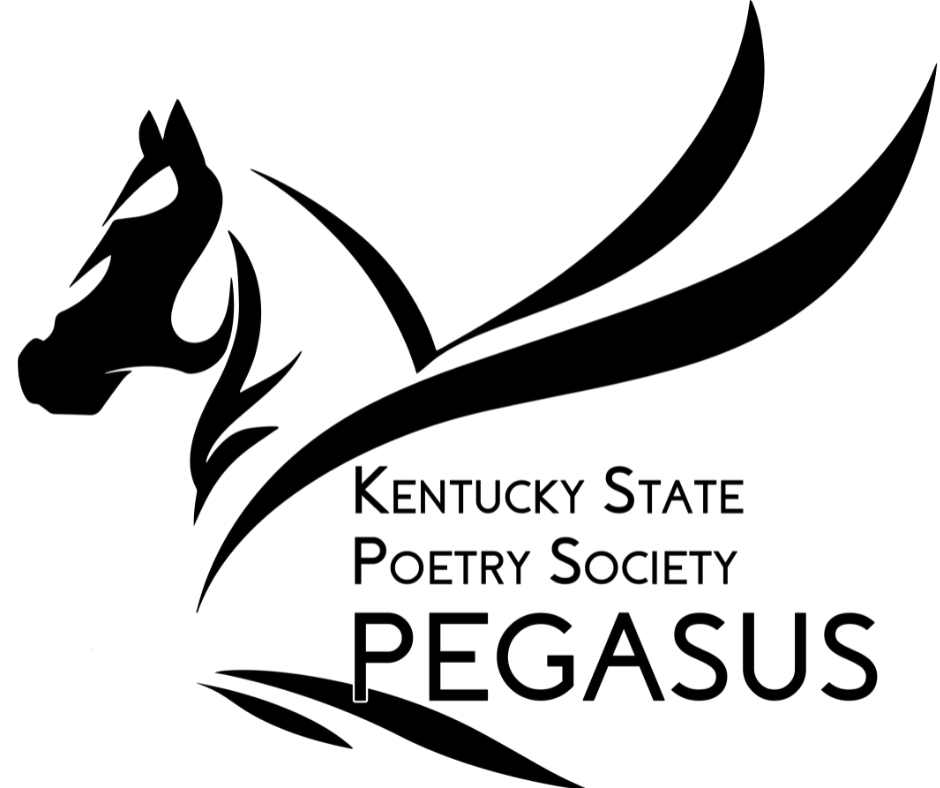At Pegasus we draw great pleasure in celebrating the work of our colleagues. Although Book Beat only reviews poetry, we will be happy to announce books members publish in other genres. If you are a member of the Kentucky State Poetry Society and interested in having a recently published work reviewed for publication in Pegasus, please contact:
Elaine Fowler Palencia
3006 Valleybrook Drive
Champaign, IL 61822
(217) 621-1093
Katerina Stoykova, Between a Bird Cage and a Bird House: Poems. Lexington KY: University Press of Kentucky. © 2024. 91 pages. $19.95 paper, $29.95 hardcover. Available here.

A red bird soaring against a field of blue, carrying a snail shell on its back. This image, created by Bulgarian artist Luba Haleva to grace the cover of Katerina Stoykova’s latest book of poetry, crystallizes the basic story of the collection, which is about the author’s leaving one home (Bulgaria) and finding another. America is where the bird has flown, carrying its past home upon its back. The same bird/snail symbol, printed in black, flies in the corner of many pages. It is inescapable, this image of burdened flight. The poem “Visit” says, “I visit my homeland the way a snail tries/to fit back into his old shell. /Day after day I writhe inside, counterclockwise . . . Snail is the most beautiful Bulgarian word, / says my son, who is studying the language. /I thought it meant love.” The restrictive yet protective nature of the snail shell reappears in “Dear Numbness,” which begins, “you are a funny kind of snail—/instead of in a shell, you crawl around/your own freezer. You doubt anyone/ would understand. You hate your heart/ frosting into a snowball, but you need/ a safe space.”
Coming to live in America has not been an easy transition, for many reasons. Obviously, there are the differences between the two countries. The relative freedom of life in America brings possibilities both exhilarating and frightening. “America, you are so big. I feel/endless. /Not the spider/but the web itself.” At times, the new country becomes a romantic partner, with the speaker struggling to find love, yet maintain an identity in the relationship: “America, would you be a part of me/but not me? / Would you let me keep whole? /I love you. /Don’t let me go.” Then there are the hints about what was left behind. “Eighth Floor Balcony Ghazal” presents a topic more fully explored in Stoykova’s Second Skin collection—domestic abuse. That balcony in Bourgas, Bulgaria, a liminal space that can turn lethal, reappears in “Black Stone Over White Stone,” modeled on Cesar Vallejo’s famous poem. In Stoykova’s version, “I will die on the eighth floor balcony at sunrise . . . Katerina died—during her visit. / Whoever is returning to Kentucky/ isn’t she, believe me.” Maybe you can’t go home again, but neither can you leave home for good.
People who emigrate not only take their defining past along, but also more recent concerns. So, there are other stories—for example, a vexed relationship (“He Catches a Magic Fish”), motherhood (“There once was a woman who wanted to be a better mother”), and dreams, as in the charming “Darling,” which imagines the speaker reconnecting gloriously with an old love. Meanwhile, his “missus was cooking/through all this, the whole time/beaming at me while/you and I discussed/signing papers, seeing each other again.” Shadowing all are other immigrations, as in “Sus-toss,” which a note explains is a Hopi word for “the disease people suffer when they move to live on new lands.” This poem lists all kinds of paralyzing dislocations; e.g., moving to a new place can be “a disease that makes you not want the things you want. /It makes you not want to think about/the things you want to think about.”
The overall tone of this collection is so confiding, so honest, that it is tempting to believe every detail “really happened,” which would deny the imagination a place. The very short poems, which are more like texts received on a phone, intensify our sense of listening in on a private conversation between the immigrant and a personified America. The list poems buttress this feeling of material that walked right out of a life and onto the page, with little mediation. But there is too much structure, too much art and craft for that, in this carefully put together, intelligent book, in which America looms in various guises—friend, stranger, lover, confidant, distant entity who may or may not be listening. Some of the poems sound almost like prayers, some like conundrums written in a diary meant only for the writer to see: Everybody needs a pen/to scrawl what they can tell/everyone else but/that one person.”
This book is an important addition to the literature of immigration. And there’s some good news for the reader who wants more, in this short poem: “America, there will be nothing left/to say. /But not yet.”
Jean Tucker, The Country Where You Live Now. Independently published. Foreword by E. Gail Chandler. 157 pages. $15. Available here.

Jean Tucker, widely published poet, editor, and teacher, was a longtime member of KSPS and of the Green River Writers of Louisville. When she died unexpectedly in 2022, she left behind several chapbook manuscripts for her literary executors to consider. E. Gail Chandler, another KSPS member, took the lead in editing this anthology, which contains five of those manuscripts. Each displays Jean’s attention to the little things (“the red and white cat curled like rising dough/in a wicker basket in the florist’s window”); her travels—poems set in Greece, France, England, Sierra Leone, Germany, around the U.S., and more; political astuteness; compassion; emotional and artistic honesty, and, a golden thread through it all: love for her partner, Bill Martinez, from their meeting through his decline and death.
Book One, The Fortune Unread, is the work of a poetic foreign correspondent, sending dispatches that balance the world’s light with dark, beauty with sorrow, compassion with complicity, as in “Athens Central Market. June 12, 9.A.M.,” which ends with quiet foreboding: “I choose the swooning strawberries/mounded in their little plastic tub /Each is a perfect heart/that submits to the knife, / staining my hands.” “Blue Licks Battlefield State Park Day 1,669 of Operation Freedom” asks us, by juxtaposition, to see that every war, no matter the justification, diminishes us, as shown by this reduction of the American flag: “In the tangle of dead brush under some holly/a candy wrapper blares red white and blue—stars on a dark field, /a hint of wavy stripes.” Indeed, the epigraph of the entire collection comes from John Donne: “No man is an island, entire of itself . . . Any man’s death diminishes me.”
The overall tone, while regretful, is not bitter. Simply, there are lessons to be learned and remembered. One series of poems is literally about learning, inspired by Jean’s teaching ESL at Jefferson Community and Technical College. “Night School” says of an immigrant student: “He has parked his diplomas out back/by the night custodian’s smoking chair/along with the ministerial portfolio/he will one day reclaim after recrossing /that border where he shredded his life/to save it.” Everywhere the reader finds mute witnesses to the passage of time, as in a home where, “Inside the porch latticed in spider webs/the children’s height marks climb/hand over hand/in carpenter’s pencil on the doorjamb.”
Book Two: Scenes from the Old Neighborhood, affords glimpses of childhood and family—measles, a mother’s bad days, high school home ec classes (“What heavenly good could it have done/to sew white bib aprons with our names/stitched across the front in royal blue?”) as well as the eerie,” To the Brother I never Had (“When I move from house to house I move your absences/like the people of Madagascar moving/the bones of all their ancestors.”)
Book Three, When We’re Not Looking, features several surprising poems about inanimate objects— “Smith-Corona at Two A.M.,” a ’76 Chevy Nova, a spoon, scissors, a pack of tissues, a pair of black boots which may wake in the morning before the speaker. Then, “surely they will not wait for me.” Mischievous smiles hide throughout the collection.
Much of Book Four, The Agnostic’s Christmas, comprised Jean’s first chapbook, published in 1967 under that name. The mood is generally somber, as in “The Watch:” “My throat is tight/with words I should have spoken. Soon the light/ will break upon our faces to explain/our wounds to us” or in “From an Armament Museum” where, after a survey of antique items—armor, silverware, bejeweled swords, flags, it all comes down to “money beaten into swords.”
Book Five, The Country Where You Live Now, is the heartbreaker, beginning with “Augury” (“That your mind will leave your body rudderless/ is in your opaque face”), then looping back through early memories of the beloved before setting an unalterable course toward the country he lives in now—dementia—and beyond, to life without him, as in “New Year’s Morning: Full Sun on Snow,” which asks the question, “How do I open this year/in which you will never be?”
It isn’t often that one gets the chance to supply one’s own, best testament to a life. Jean Tucker’s posthumous poetry collection does just that.
